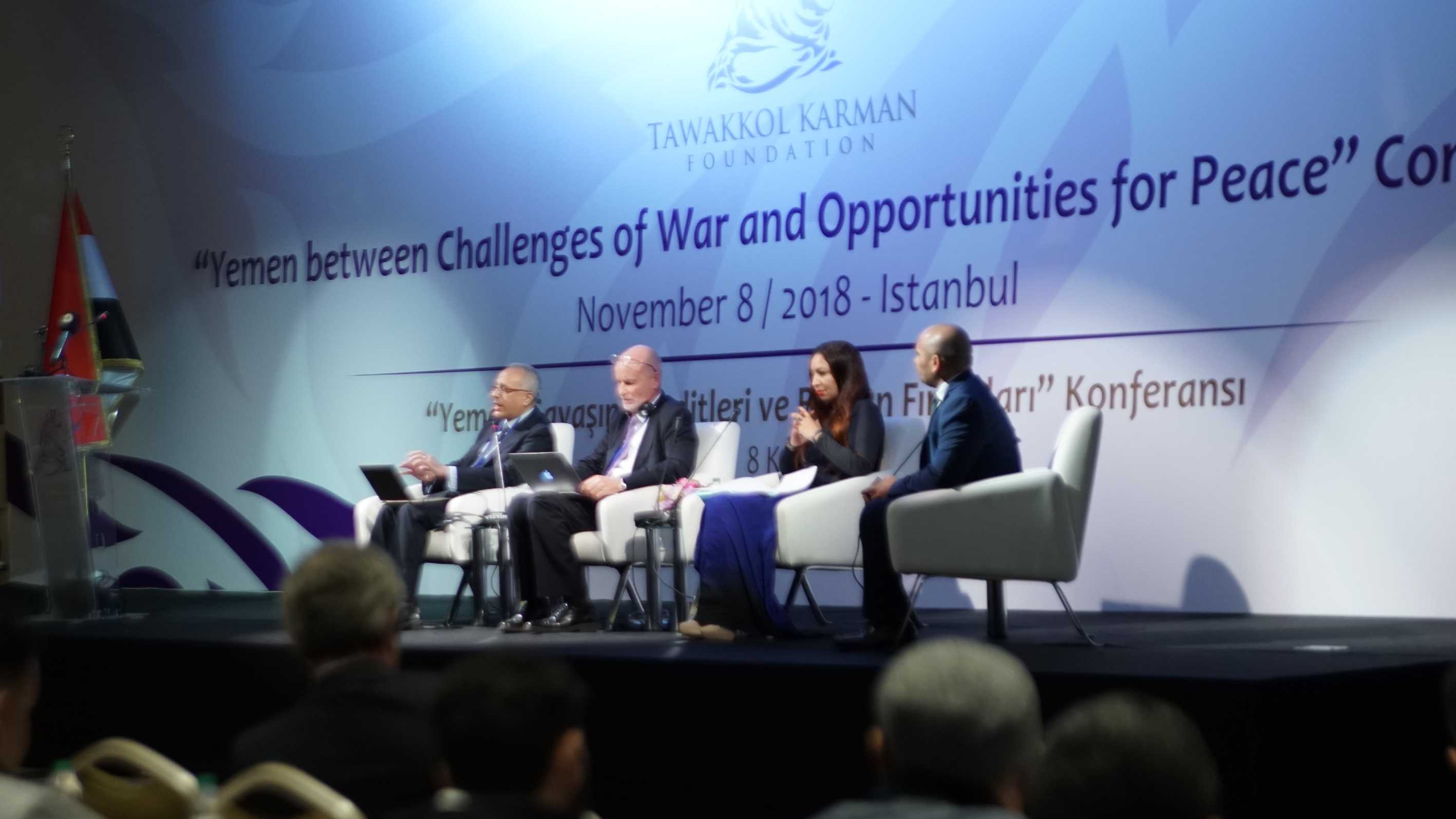TKIF News

TKF conference in Istanbul Supports Calls to stop the War in Yemen and Withdraw Arms from the Militias
A conference in Istanbul, Turkey, supported international calls to stop the war in Yemen, and to withdraw arms from the several armed militias.
The “Yemen: War Challenges and Peace Opportunities”, convened on Thursday, in Istanbul, organized by Tawakkol Karman Foundation, with the participation of international and Yemeni researchers to shed light on the Yemeni issue.
In the opening session, Tawakkol Karman, Noble Peace Laurate, said she hopes that war will end in Yemen, with a “sincere and serious international efforts”.
Karman proposed a number of steps to end war and establish peace in Yemen, including “stop of the war, lift blockade, and withdrawal of UAE and Saudi Arabia form the country”, also to “restore the political process that halted by Houthis coup d’etat, against the legitimacy”, she added.
Karman stressed the need to form a military committee to withdraw weapons from all militias, either Houthis group, or other militia established at the conflict areas in Yemen, also to establish a national unity government by all entities, following Houthis turn into a political party, to organize the constitution referendum and the public elections.
Ms. Karman also called to establish a national reconciliation commission, reparation, and reconstruction, and to obligate the Arab Coalition led by Saudi Arabia and UAE, to compensate for the destruction inflicted on the country.
Vice-president of Justice and Development ruling party in Turkey, Judat Yilmaz, said his country unequivocally condemns, misuse of sectarianism as a new source of conflict in Yemen, confirming that “sectarian conflict will turn the region into hell’. He clarified that his country respects all sectarian identities, but it opposes sectarianism.
Yilmaz stressed Turkey support to Yemen independence, sovereignty, and unity, and to the legitimate government.
“we believe that the parties in Yemen can solve their problems, I hope that this crisis will be handled urgently, and end the humanitarian sufferings,.. this is very important for the gulf region security.. Yemeni crisis became very serious and Yemen is facing major humanitarian crisis”, he added.
Former Tunisian president, Moncef Marzouki, called western and Arab media to pay attention to the humanitarian crisis that Yemen is living.
He urged media outlets to depict child Amal Hassan image, who died of malnutrition, everyday in their frontpages, and at the TV channels screens, including Aljazeera.
“why not such image being featured everyday and evet moment, there should be an attention to this crisis equal to that of Jamal Khashoggi’s.. Yemen is living the worst humanitarian crisis we ever saw”, he added. He urged to prosecute those committed crimes against Yemen at the international fora, those who planned and contributed in launching the war in Yemen.
The Egyptian opposer, and the leader of the Egyptian "Ghad Al-Thawra" party Ayman Nour, backed Marzouki’s intervention on the Yemeni crisis, saying “the organized crime and terror imposed on Yemeni people is reflected in the deceased child Amal Hussein”.
“Amal and tens of thousands of Yemeni children were the victims of struggles with countries like Iran, and Yemen was the conducive territory for such countries to be the playground of conflict that unknow when it ends”, he added. He confirmed that the Conference gives us a genuine hope to improve the performance of the Arab Spring supporters.
Discussion sessions were convened following the opening to discuss the Yemeni issue with all its elements, dimensions, and local, regional, and international complexity. The first working paper in the first session discussed the roots and reasons of the conflict in Yemen”, by the Yemeni researcher Abdunnasir Al- “Mwuadi’.
Second working paper “Yemen in the regional conflict balance” by Celine Grizi, a geopolitics professor and researcher, policies advisor and international relations observer, France. Third paper on “the role of religious groups in the conflict” by Francois Bourga, the political scientist and Arabist, senior researcher in the National Center for Scientific Researches, France.
The second session, first paper discussed “the state of human rights in Yemen, in light of the war” by the Yemeni activist and researcher Nabeel Al-Baidhani, and the second paper on “the international responsibility to the humanitarian issue in Yemen”, by Patricia Lidle, senior international communication expert, in the communication and policy strategies, and conflict management, Canada.
The Conference concluded with the third session that discussed in its first paper, “international organizations work in Yemen; reality and aspirations”, by Glamor Giartana, associate researcher in the IRIS, specialized in political geography in Latin America, and the Middle East, France, and the second paper on “the future of national reconciliation in light of international experiences, by Ridwan Zyada, researcher in the Arab Center and the American Institute for Peace, and the executive director of the Syrian Center for Political and Strategic studies, Washington DC, US.
